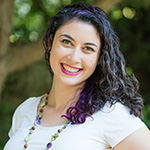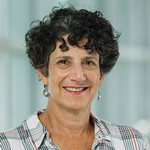Jewish Feminism: From Brandeis to the World
Nov. 11, 2020
By Amy Powell
Rivka Cohen and Naima Hirsch's journey from Orthodox girlhoods where they grew up without discussing bodies and sexuality to editors of a successful book modeled after the "Vagina Monologues" runs straight through Brandeis.
In October, HBI hosted these young women, along with Alona Weimer, (Brandeis ’18) and Jordyn Kaufman, two of the many contributors to "Monologues from the Makom: Intertwined Narratives of Sexuality, Gender, Body Image, and Jewish Identity" as they read some of the poetry and prose in their book. They shared their stories of exploring Jewish feminism at Brandeis and the ways they found the community they needed to allow these ideas to blossom and grow, enabling them to continue to form this sort of community among other young Jewish observant women after leaving Brandeis. The courageous book they created together continues that work, opening an avenue for ongoing dialogue and the breaking of taboos. "Monologues" is also edited by Sara Rozner Lawrence, Sarah Ricklan and Rebecca Zimilover.

"I wouldn't be who I am today or the feminist I am today if it weren't for Brandeis so it feels really incredible to be back here," said Cohen '17. She pointed to specific things at Brandeis that jumpstarted her journey within Jewish feminism. One pivotal point was becoming a gabbai at the Orthodox minyan. "I understood it to be an inherently feminist role and I fought together with others in the community to increase women’s participation in Orthodox services and in the larger Jewish community."
The religious feminist journey continued as she and some of the others in this community ultimately co-founded JFAB, The Jewish Feminist Association at Brandeis, and one of the co-sponsors of the Monologues event at HBI, along with Near Eastern and Judaic Studies, Brandeis University Creative Writing and Brandeis Alumni Association.
"On a more personal note, my time at Brandeis also intersected with my struggle with my sense of sexuality. I didn't have much sex ed growing up in the Orthodox community and I even ditched portions of sex ed at the Brandeis orientation because didn't think it applied to me," Cohen said. "It was only during my sophomore year, during Vagina Week, which is the week leading up to the 'Vagina Monologues,' that I decided to attend an event with a sexologist who spoke about sex with an openness and positivity I had never heard before. But, I was still deeply entrenched in the Orthodox community. The tension between my feminism and Jewish approaches to sexuality were stark and difficult to navigate."
 Naima Hirsch, now in her first year at Yeshivat Maharat, graduated from Hunter College, but spent three formative summers at Brandeis, two with the high school program BIMA and one in 2018 with HBI in the Gilda Slifka Summer Internship program.
Naima Hirsch, now in her first year at Yeshivat Maharat, graduated from Hunter College, but spent three formative summers at Brandeis, two with the high school program BIMA and one in 2018 with HBI in the Gilda Slifka Summer Internship program.
"When I was an intern at HBI, I wrote a short poetry chapbook called 'Daughter of the Tribe.' The eight weeks that summer was an incredibly formative experience for me both as I explored my identity as a Jewish women, as a feminist, as a writer. I'm really grateful to HBI for giving me the experience and the language to be here today. I think it's a big stepping stone for me to be here today," said Hirsch.
 The pieces they read detailed important turning points in their lives and issues that were hard to discuss in their communities. Jordyn Kaufman's prose, "Built Up Bravery," detailed the awkwardness of getting her period and not discussing it with anyone, even her mother.
The pieces they read detailed important turning points in their lives and issues that were hard to discuss in their communities. Jordyn Kaufman's prose, "Built Up Bravery," detailed the awkwardness of getting her period and not discussing it with anyone, even her mother.
Weimer wrote about "Falling in Love with Tefillin," as she watched a friend grapple with his own readiness for prayer in the act of wrapping his tefillin. She described the moment later as taking place during a casual shacharit service in the Shapiro Lounge during her time at Brandeis.
 "To be an observant Jew and a feminist, there is always some grappling with ritual and the embodiment of that ritual. … This project lets us describe and name all the ways we have been grappling with ritual, sexuality and all the ways our bodies interact with Judaism," Weimer said.
"To be an observant Jew and a feminist, there is always some grappling with ritual and the embodiment of that ritual. … This project lets us describe and name all the ways we have been grappling with ritual, sexuality and all the ways our bodies interact with Judaism," Weimer said.
Rivka Cohen read an excerpt from her prose, “Touching Boy,” and how she broke shomer negiah (the practice of not touching a member of the opposite sex) for the first time. Other themes in the book deal with masturbation, LGBTQ issues, ritual, prayer and a general lack of openness about sexuality.
The writing draws important connections between tznius (modesty), sex education and vulnerability to sexual assault, and between emphasis on the body and the silencing of women's voices, said Lisa Fishbayn Joffe, HBI director. Some of the themes deal with boundaries and the way that the education they received did not teach some of the writers how to create their own boundaries with regard to consent, she added.
Joffe praised the book for stimulating intergenerational and important conversations around these subjects. "It has been my pleasure to follow this project from an early stage. I found this work, and the collaborative process for creating it, truly inspiring. This brave collection explores the tension between religious norms and the lived experience of young Jewish women. Through the lens of poetry and prose, contributors engage with the complex impact of gendered codes of modesty on Jewish women from adolescence through to motherhood."
 Amy Powell is the assistant director of HBI.
Amy Powell is the assistant director of HBI.